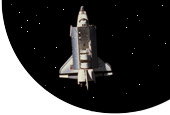Loading |
 |
|
||||||||||||||||||||||||||||||||||||||||||
NASA Promises Again... Thursday regular ISS Status Press Conference , June 21, 2001 John Curry, ISS Lead Flight Director Rob Navias, JSC PAO Official
Oberg: (general comments) I want to ask about other information that we used to get that we don‘t. I want to know, at what point we expect to see any of the crew written reports, either daily reports or weekly reports, in English or Russian, that presumably are being written, but we haven’t seen any since day 1 of this expedition Is there some reason for that, or can we expect any change with Expedition-3? Curry: I’ll tell you what I know on Expedition-2. You’re talking about the “Shep’s logs“, that Shep wrote in Expediton-1. This particular crew has chosen not to write those, so we don’t get a daily log from them summarizing what they’ve been doing. They’re much more verbal oriented so when they want to provide us information, they would rather talk to us directly on the open air to ground. If anybody watched today’s robotics, Susan immediately said, ‘Hey can we get to talk to the robo team and discuss what happened today?’. That’s their method of getting information to us, so there is no written reports they’ve been sending down. That’s just this crew’s preference. Oberg: (Incredulously) No written reports at all? Curry: They have not done anything like that. There’s been no status information like that that has come down in terms of the report format. There’s been like some of the other things, we’ve are talking about doing with them, just so you know we’re working on information exchange, is like debrief questions and those kinds of things. And since we’ve got time now for this increment, this crew has requested and I agree with it, that we package up some lists of questions and those kinds of things that we put up. Those go up in normal OCA traffic, which are obviously accessible by yourself, and then they will verbalize down through an interactive exchange with flight directors, whoever’s asking the questions on the various systems, how things are operating, how things are doing. I personally liked the ship’s logs as well on Expedition-1 since they were a good source of information, but we’ve gotten our information from Jim, and Susan, and Yuri verbally, for the most part. Oberg: .. the people who sit in the press office can, but the public access to air-to-ground has been cut off as well since Expedition-2 began. Is there any work going on to restore public access to the air-to-ground? Navias: As we’ve discussed before, air-to-ground is accessible through mission audio circuits. Reporters at NASA centers, or reporters on an enterprising basis may choose to extend mission audio to their offices, which is certainly doable, and listen to air-to-ground to their heart’s content 24 hrs a day 7 days a week. Curry: There’s not been any written reports that have come down from this crew, I promise you, they have not written down status information. Oberg: If there were material circulating on internet purporting to be reports, purporting to be debriefing notes from Expedition-1, how would you advise people to treat these documents? What are your recommendations about credibility? Are they a journalistic resource or should we be cautious about their origin? If a document showed up, this is a status report, this is a debriefing transcript, what would you advise people who happen to have these fall into their laps do with them? Navias: Which documents are you referring to? Oberg: Say, something purporting to be a transcript Expedition 1 debriefing sessions. Navias: (Pause, then carefully) All the information that is commonly accessible to the public on expedition operations is being distributed either in the form of air to ground, or in the form of our status reports, we do daily commentary. And we are doing the best within the resources available within this agency to present expedition operations in the best and most timely fashion. Oberg: It’s just less than we did on Expedition-1. Navias: It’s a different FORM of distribution of information based on our resource capability and based on the agency’s decision in the form of disseminating agency-wide news on other things this agency is doing concurrent to expedition operations as well. Oberg: It strikes me, it’s being made a whole lot harder for everyone, and being made impossible for the general public Navias: Well, I think you’ll find that reporters down at KSC are getting as much as they can possibly consume in terms of their continuing coverage of the mission. We are in fact working as we’ve discussed before on distributing air-to-ground on the Internet, on the human spaceflight website, and we are hopeful of reaching a technical conclusion to that that will provide air-to-ground to be distributed on the internet very soon. Oberg: What can potential users do to persuade management to make the right decisions? Navias: We’re working on it and we are nearing a conclusion. (Quickly) Do we have any other questions on today’s activities -- Mark [Carreau]? |
home | profile | articles | books | lectures | jim speaks | humor
links | email
Copyright 2010 James Oberg. All Rights Reserved
Site Designed and Maintained by YoeYo.com
